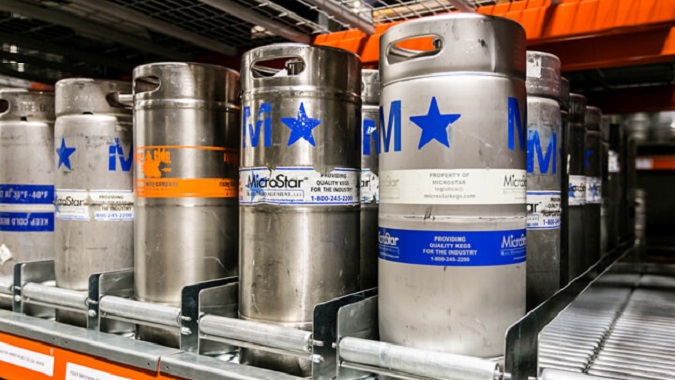Quite often I’m asked whether our beer is available in grocery stores, bars, or other places that sell alcohol. The short answer is no, because we do not distribute any of our beer. The follow-up question is always… why? Quite simply, we cannot distribute beer because we do not have enough beer to distribute. Our operation is so small that to let even a small amount of beer leave our tasting room leads us to supply shortages, and we have to cross items off our menu even faster than normal. If we dig a little deeper, another issue is that Virginia is not set up for little guys to distribute beer, even small amounts of beer. Here’s a quick breakdown of why.
Some states are referred to as “self-distribution” states, and others as “three-tier” states. The differences have quite a profound impact on distribution (spoiler alert, Virginia is a three-tier state).
Self-Distribution States
In a self-distribution state, a brewery may also act as their own distributor. For example, a representative from the brewery is able to take a keg of their beer to a local bar, strike a deal with the restaurant or bar manager and have their beer served at that bar. It becomes the responsibility of the brewery and the bar manager to work out the details of how much product will be purchased, how often, what varieties and so on. The advantage of this model is that there is no middle-man, which can improve margins for the brewery and the bar manager, and the bar manager has more freedom to “trial run” small batches of beer from a wide variety of breweries. The disadvantage is that the bar manager has to work with many distributors (breweries and traditional distributors) to fill their taps. Instead of one or two contracts to deal with, a bar manager may have a dozen or more, which adds extra time and headaches if something were to go wrong, like getting a bad keg.
Some self-distribution states:
- Alaska
- Colorado
- California
- North Carolina
- Washington State
Three-Tier States
In a three-tier state, all distribution is handled by a licensed distributor, that operates separately from the breweries that they purchase from. The three-tiers of this system are manufacturer (brewery), wholesaler (distributor) and retailer (bar, restaurant, etc.). The advantage of a three-tier system is that the brewery is able to almost completely offload account management to a distribution partner, and the distributor assumes responsibility for promoting and selling the product. Bar managers also have fewer points-of-contact to deal with for a larger variety of beer, as one distributor will provide many brands to the same retailer. The disadvantage, from the perspective of the little guy, is that there is almost no incentive for a distributor to carry a small volume of product from one brewery. Wholesale is a high-volume, low-margin business, which means the distributor does not make any money unless they sell a large quantity of a particular beer. Large quantities of beer is something we currently can’t provide.
Some three-tier states:
- Alabama
- Florida
- Georgia
- South Dakota
- Virginia
I have two notes to close with. First, most of my information on self-distribution states comes from the Brewers Association. When researching this, I found very quickly is that fine print is very tricky. Technically, Virginia is listed as a self-distribution state, but only because the VA ABC considers the transfer of beer from one brewery to another brewery (under the same ownership) to qualify as “distribution”. Traditional distribution (brewery to third-party retailer) is not allowed in Virginia. Second, there are some small distributors cropping up that are willing to work with breweries that can only release very small amounts of beer and maybe only fill one or two accounts. God bless these guys because they work very hard for very little money. One of these companies is Monarch Distribution, based in Round Hill, VA.

